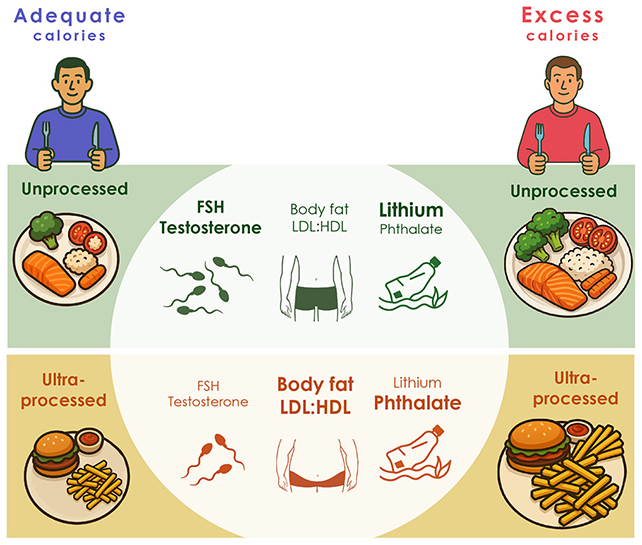A new study shows that ultra-processed foods (UPFs) can harm men's health in a trio of notable ways: through weight gain, through the disruption of natural hormones, and through a reduction in sperm quality.
The researchers behind the study, led by a team from the University of Copenhagen in Denmark, wanted to see if the processed nature of food makes a difference to a person's health – even if calories and nutrients in a diet are kept the same.
Plenty of research has linked UPFs with poor health outcomes, but it's not always clear if this is because of how the food has been made, because of the ingredients that go into them, or because we tend to eat them in greater amounts.
Related: Your Food Packaging Is Shedding Microplastics Into Every Meal, Study Reveals
"We were shocked by how many body functions were disrupted by ultra-processed foods, even in healthy young men," says molecular biologist Romain Barrès, from the University of Copenhagen.
"The long-term implications are alarming and highlight the need to revise nutritional guidelines to better protect against chronic disease."

For their study, the researchers signed up 43 cisgender men aged between 20 and 35, who tried two different diets, with a three-month break in between. The two diets were matched by calories and nutrient intake, but one went heavy (77 percent of calories) on UPFs and the other was mostly (66 percent of calories) unprocessed foods.
While on the UPF diet, the men gained around a kilogram (2.2 pounds) of extra fat mass on average, while levels of a plastics-related pthalate chemical called cxMINP also rose a worrying amount: it's a substance that's known to interfere with natural hormones.
The third negative effect of the UPF diet spotted by the researchers was a drop in testosterone levels and in the follicle-stimulating hormone that's crucial for sperm production. It's notable that sperm quality has decreased worldwide as UPFs have become more widely eaten, and scientists have long suspected there might be a link.
"We found that UPF consumption influences cardiometabolic and reproductive health," write the researchers in their published paper. "Diets also caused a trend in the differential accumulation of contaminants in blood and seminal fluid"
UPFs are characterized both by the synthetic ingredients included in them (which you wouldn't find on a grocery store shelf), and by the ways they are treated and manufactured on an industrial-scale.
Their introduction into our diets has meant lower costs and longer shelf life for foods, as well as enhanced taste and flavors, but the evidence is rapidly mounting that they're pushing us towards obesity, various cancers, and cognitive decline – and they're not great for the planet either.
While this study uses a relatively small sample size over a short time period – and only involves men – it's more evidence that we need to rethink how many UPFs we're taking on board, and how healthier alternatives could be eaten instead.
"Our results prove that ultra-processed foods harm our reproductive and metabolic health, even if they're not eaten in excess," says nutrition scientist Jessica Preston, from the University of Copenhagen.
"This indicates that it is the processed nature of these foods that makes them harmful."
The research has been published in Cell Metabolism.
